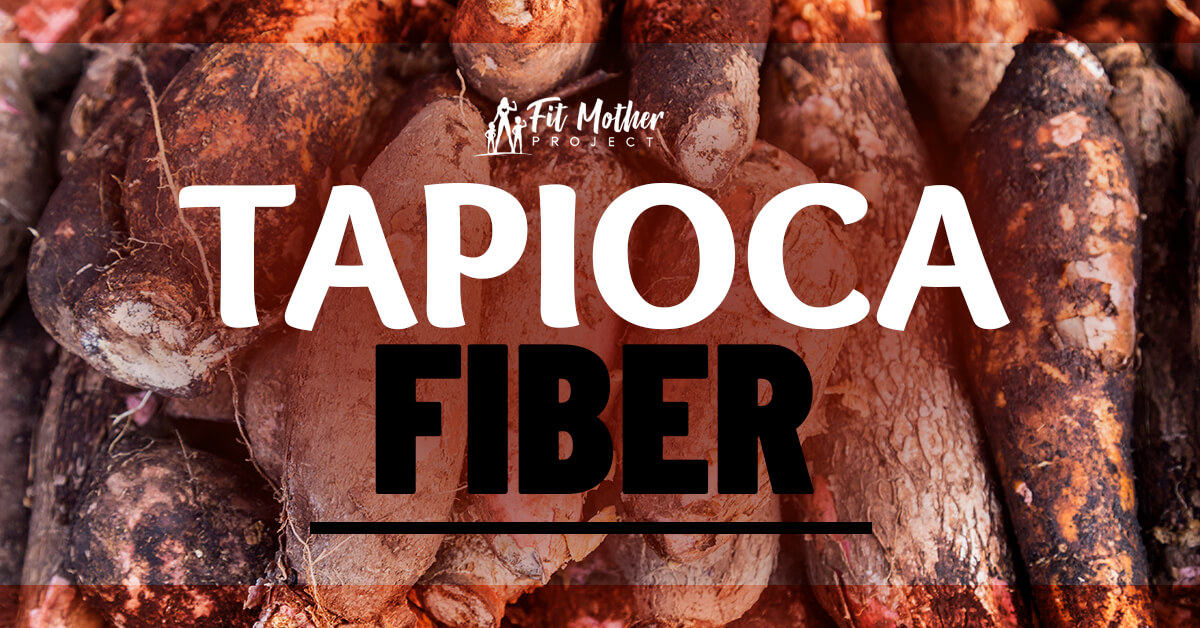We often hear about the many benefits of fiber. And, because it has the word “fiber” in it, you probably assume that tapioca fiber is good for you. But is it?
More importantly, what exactly is tapioca fiber?
Tapioca is a type of starch extracted from cassava, which is a root vegetable.
The starch form of tapioca is rich in carbs and found in many breads, baked goods, and desserts.
It's gluten- and grain-free but doesn't contain much fiber.
Prebiotic tapioca fiber is sold as a dietary supplement, and it may offer health benefits.
Keep reading to learn more about the possible benefits or drawbacks of tapioca fiber and other tapioca-containing products.
Here are 20 nutrient-dense foods to add to your diet today!
In just 6-weeks on our FOUNDATIONS Program, you'll transform your health and body, for the rest of your life!Join our 6-Week Program...
You'll Gain Health for Life!
How Much Fiber Should I Eat?
Many people don't meet their body's daily fiber needs because of poor dietary habits.
Fiber recommendations for men and women are as follows:
- Women: 21-25 grams per day
- Men: 30-38 grams per day
The exact amount of fiber you should consume daily depends on your gender and age.
While you can meet daily fiber needs by eating a variety of healthy plant-based foods, fiber supplementation is beneficial (if your doctor gives you the OK), especially if you have high cholesterol or you're trying to lose weight.
As women age, our immune systems get weaker. It’s a fact. After 40, you become more vulnerable to viruses, cancers, and even Alzheimer’s disease. Average women just let this all happen. But now, with Immune Booster RX, you can take the power back.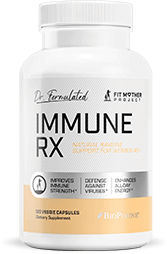
![]()
The Immune Booster Women 40+ Are Using To Kill Viruses & Feel Younger…

Is Tapioca Good for You?
The starch form of tapioca offers few essential nutrients other than carbohydrates, and that includes fiber.
It's an alternative to gluten-containing grains if you're following a gluten-free meal plan.
However, tapioca fiber supplements containing non-digestible tapioca, are a better source of dietary fiber.
Nutrition facts for common tapioca products include:
Tapioca Flour (1/4 cup)
- Calories: 110
- Carbohydrates: 27 grams
- Protein: 0 grams
- Fat: 0 grams
- Fiber: 0 grams
- Sugars: 0 grams
Tapioca Pearls (1 tablespoon)
- Calories: 30
- Carbohydrates: 7 grams
- Protein: 0 grams
- Fat: 0 grams
- Fiber: 0 grams
- Sugars: 0 grams
Prebiotic Tapioca Fiber Syrup (1 tablespoon)
- Calories: 10
- Carbohydrates: 6 grams
- Protein: 0 grams
- Fat: 0 grams
- Fiber: 6 grams
- Sugars: 0 grams
Tapioca fiber supplements offer a variety of health and wellness benefits, especially if your current fiber intake is low, but it's important to check in with your doctor before taking dietary supplements.
This is especially true if you take any medications.
In just 6-weeks on our FOUNDATIONS Program, you'll transform your health and body, for the rest of your life!Join our 6-Week Program...
You'll Gain Health for Life!
What Are Other Names for Tapioca Fiber?
Additional terms you might see on the ingredient list of foods or supplements containing tapioca fiber include:
- Soluble tapioca fiber
- Soluble corn fiber
- Soluble vegetable fiber
- Soluble fiber from tapioca
- Soluble fiber from corn
- Non-GMO tapioca fiber
- Resistant dextrin
- Digestion resistant dextrin
- Digestion resistant maltodextrin
- Prebiotic corn fiber
- Prebiotic soluble fiber
- Non-GMO corn fiber
You might see these ingredients on various different prepackaged food products.
Examples include protein bars, energy bars, and some baked goods.
As a busy women, it’s challenging to stay consistent with healthy eating. That’s why we created SuperFuel… the delicious “all-in-one” nutrition shake for busy women 40+ to give your body the protein + key nutrients you need for more energy, fat burning, and muscle building.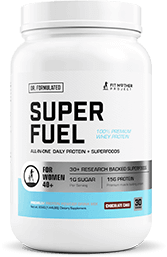
![]()
Meet SuperFuel. The Delicious Protein Shake Packed With 40+ Energy-Boosting Vitamins & Superfoods (Designed For Busy Women)

Is Tapioca Fiber Safe and Healthy?
Tapioca starch is generally recognized as safe by the U.S. Food and Drug Administration (FDA).
However, prebiotic fiber supplements aren't as tightly regulated by the FDA.
It's important to choose supplements that have been third-party tested for quality and purity.
What Are the Benefits of Tapioca Fiber?
Prebiotic tapioca fiber appears to offer a variety of health and wellness benefits, including:
Enhanced Good Gut Bacteria
Supporting good gut bacteria health is possible with the help of prebiotic fiber.
This type of plant-based fiber stimulates healthy gut bacteria growth, which improves your overall health and maximizes disease prevention.
Immune System Support
Studies show that probiotics (good gut bacteria) help strengthen your body's immune system.
Since prebiotic tapioca fiber supplements support healthy gut bacteria growth and maintenance, consuming prebiotic fiber can lower your chance of getting ill or developing a chronic disease.
Improved Bowel Health
Prebiotics and probiotics in your digestive tract support intestinal health, including bowel (large intestine) health.
Prebiotic fiber can improve symptoms of irritable bowel syndrome (IBS), constipation, diarrhea, and other GI problems, but check in with your doctor if you struggle with ongoing gastrointestinal issues.
Healthy Weight Management
Fiber is beneficial for healthy weight management for a variety of reasons.
Fiber supplements fill you up without the calories, as your body doesn't fully digest or absorb fiber but it still takes up space in your stomach.
Studies show that fiber helps reduce your overall calorie intake and enhances weight and fat loss.
Cholesterol Management
High cholesterol is common, but it dramatically increases your risk of heart disease.
Fiber is known to help lower high cholesterol, and tapioca fiber is no different — especially because it's a soluble fiber.
Ingesting 5-10 more grams of soluble fiber daily can decrease your low-density lipoprotein (LDL), which is your bad, blood cholesterol.
This in turn reduces your risk of a heart attack, stroke, and heart disease.
Heart RX is for women who are taking (or have taken) medication for lowering cholesterol and blood pressure. Heart RX will provide you with the natural support to improve all aspects of your heart health – including: blood pressure, healthy cholesterol, and better circulation.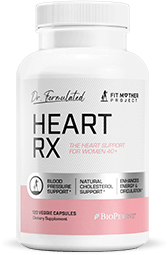
![]()
Meet Heart RX. The Blood Pressure, Cholesterol, and Healthy Circulation Support
For Women 40+

Blood Sugar Control
Ingesting tapioca fiber helps improve blood sugar control, which is beneficial if you're at risk of developing diabetes or you've already been diagnosed with diabetes.
Resistant starch like tapioca fiber may lower blood sugar after meals, improve insulin and glucose metabolism, and boost satiety.
The fact that tapioca fiber enhances weight loss is another huge benefit of this type of fiber on blood sugar control.
Improvements in Brain Health
Believe it or not, prebiotics (including prebiotic tapioca fiber) offer improvements in brain health.
Studies show that prebiotics can improve memory, learning, mood, and overall cognition while reducing dementia and possibly offering therapeutic effects on people with autism.
Keto-Friendly
Prebiotic-rich tapioca fiber is sugar- and net carb-free, so you can include it in your diet if you follow a ketogenic meal plan or you're simply trying to watch your sugar and carbohydrate intake.
Ketogenic diets are often linked with weight loss.
Gluten-Free
If you have an intolerance to gluten and need to avoid it, tapioca flour, tapioca pearls, and tapioca fiber are safe for you to consume, as long as these products haven't been processed in a facility with gluten-containing ingredients.
Look for products that state they are “gluten-free” on the food label.
Vegan-Friendly
Because tapioca fiber is plant-based, it's a vegan-friendly addition to your meal plan.
This type of fiber can significantly increase the amount of fiber in your diet, which in turn lowers the risk of a heart attack, stroke, and chronic diseases.
While eating a diet rich in plant foods is the best way to meet daily fiber requirements, tapioca fiber helps maximize your intake.
In just 6-weeks on our FOUNDATIONS Program, you'll transform your health and body, for the rest of your life!Join our 6-Week Program...
You'll Gain Health for Life!
Are There Drawbacks of Tapioca Fiber?
While you can reap numerous health benefits from consuming tapioca fiber and it's safe to consume when processed properly, some potential drawbacks may exist.
Examples include:
Risk of Improper Processing
If you consume improperly processed cassava root products, you may be at risk of poisoning from toxic compounds.
The good news is that commercially-produced tapioca is almost always safe, including tapioca fiber supplements tested for quality and purity by third-party companies.
Cassava Allergies
While rare, allergies to cassava products like tapioca fiber may cause allergic reactions in some people — especially those who are allergic to latex.
If you have a latex allergy, use caution when consuming cassava root or consult with your doctor.
Side Effects from Too Much Fiber
Consuming too much of a good thing can be problematic, and this holds true for fiber supplements.
Consuming excess fiber can lead to gas, bloating, cramping, or constipation.
Drinking more water with fiber supplements and all throughout the day may reduce these and other side effects.
Burn RX is for women who are working on losing weight and want to see faster and easier results from their eating & exercise efforts. It helps your body burn more fat before, during, and after your workouts, which will improve your body composition while boosting your energy + metabolism.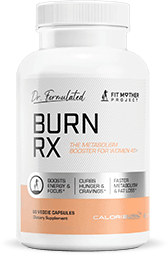
![]()
Meet Burn RX. The Safe & Effective Metabolism Booster To Help You See Faster Results

Should I Eat Tapioca Fiber?
The decision to eat (or not to eat) tapioca fiber is entirely up to you.
Tapioca flour and pearls are carb-rich but low in fiber, protein, and other nutrients.
Due to its high fiber content, prebiotic tapioca fiber offers a variety of health benefits that include lower cholesterol, healthy weight management, improved gut health, and a low risk of chronic diseases.
But it's important to consult with your doctor before taking new dietary supplements, especially if you have a medical condition.
Joint RX is for women feeling the aches of getting older and want a research-backed supplement to feel better & move younger. It will help reduce pain in your problem areas and help you workout with less pain. Joint RX increases your body's natural joint lubrication to boost your healing and recovery.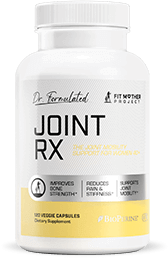
![]()
Meet Joint RX. The Advanced Joint Support, Recovery Aid, Inflammation & Pain Reducer for Women

How Can I Add Tapioca Fiber to Meal Plans?
There are several ways you can add tapioca fiber to your diet, especially prebiotic tapioca fiber syrup.
For example, you can add fiber-rich tapioca syrup to:
- Homemade protein bars
- Protein shakes
- Almond milk
- Other plant milks
- Coffee
- Tea
- Oatmeal
- Whole-grain cereals
- Greek yogurt
You can even eat a spoonful of tapioca fiber syrup instead of adding it to foods or drinks if you'd like!
Fit Mother Project is the first sustainable health & weight loss program designed exclusively for busy mothers just like you... FM30X is the first sustainable weight loss program designed exclusively for *busy* mothers like you... JOIN OUR fit
mother
PROGRAM (FM30X)JOIN OUR FIT MOTHER 30X PROGRAM
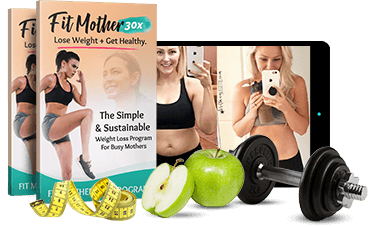
Other Sources of Soluble Fiber
You don't have to choose tapioca fiber to meet all of your body's soluble fiber needs.
Other foods rich in soluble fiber include:
- Oatmeal
- Oat bran cereal
- Dried beans
- Apples
- Pears
- Brussels sprouts
Additional food sources of fiber include:
- All fruits
- All vegetables
- Peas, lentils, and other legumes
- Nuts
- Seeds
- All whole grains
In addition to tapioca fiber supplements, psyllium and other fiber-rich supplements are available, but check in with your doctor before trying them.
Increasing your current fiber intake by just 5-10 grams daily can do wonders for your health.
Choose a variety of non-starchy vegetables (spinach, other leafy greens, cucumbers, tomatoes, mushrooms, broccoli, zucchini, asparagus, bell peppers, etc.) and fill half of your plate with them.
Fill the other half of each plate of food with protein foods (chicken, turkey, very lean beef, eggs, fish, seafood, tofu, etc.), and fiber-rich starches like corn, peas, dried beans, lentils, other legumes, sweet potatoes, or whole grains.
Add 1-2 servings of fruit to your daily meal plan too!
Examples of high-fiber foods and their corresponding fiber content include:
- 1 tablespoon of tapioca fiber: 6 grams
- 1 cup of whole-grain cereal: 3-25 grams
- 1 cup of other whole grains: 2-6 grams
- 1 cup of fruit: 1-8 grams
- 1 cup of vegetables (non-legumes): 2-5 grams
- 1 cup of legumes: 9-16 grams
- 1 ounce of nuts or seeds: 3-10 grams
In addition to choosing tapioca fiber or other fiber-rich options, consume three servings of dairy foods or plant equivalents (milk, Greek yogurt, cottage cheese, plain kefir, soy milk, other plant milks, low-sugar protein shakes, etc.).
Also, refined grains, such as white bread, regular pasta, and white rice, contain much less fiber than whole grains so avoid refined grains when possible.
The same holds true for most baked goods.
Instead, choose whole-grain bread, whole-grain pasta, brown rice, wild rice, quinoa, oatmeal, or other nutritious whole grains.
Erin Coleman is a registered and licensed dietitian with over 15 years of freelance writing experience. She graduated with her Bachelor of Science degree in nutritional science from the University of Wisconsin-Madison, and completed her dietetic internship at Viterbo University in La Crosse, Wisconsin. Prior to beginning her career in medical content writing, Erin worked as Health Educator for the University of Wisconsin-Madison Department of Internal Medicine. Her published work appears on hundreds of health and fitness websites, and she’s currently working on publishing her first book! Erin is a wife, and a Mom to two beautiful children.
Fit Mother Project is the answer you’ve been looking for. Inside the program, you’ll receive: Our Fit Mother 30X Program (FM30X) is the answer you’ve been looking for. Inside FM30X, you’ll receive: The FOUNDATIONS Program is created by Dr. Anthony Balduzzi for Women 40+ who want Lifelong Health. In just 6-Weeks following FOUNDATIONS, you'll experience: FOUNDATIONS has transformed 60,000 lives! Are you ready to experience true lasting health & results?If you’re a busy mom who wants to finally lose weight,
get healthy, and actually keep the pounds off for good,
this is the simple program you’ll love sticking to…
If you’re a busy mom who wants to finally lose weight,
get healthy, and actually keep the pounds off for good,
this is the simple program you’ll love sticking to…
LEARN MORE ABOUT FM30X »
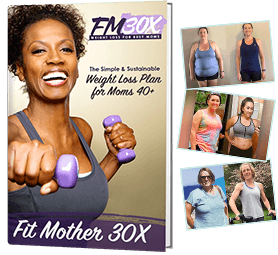
Learn More About FM30X

Join our 6-Week Doctor Designed Health Program.
You'll Gain Foundational Health for the Rest of Life.
*Please know that weight loss results & health changes/improvements vary from individual to individual; you may not achieve similar results. Always consult with your doctor before making health decisions. This is not medical advice – simply very well-researched info on tapioca fiber.

